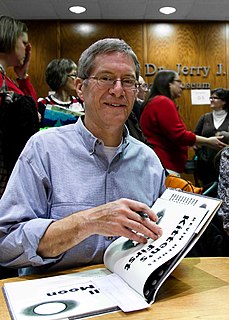A Quote by George Monbiot
Places that have become agricultural deserts, trashed by giant corporations, could be reforested, drawing carbon dioxide from the air on a vast scale. The ecosystems of land and sea could recover, not just in pockets but across great tracts of the planet.
Related Quotes
If we took 75% of the world’s trashed rangeland, we could restore it from agriculture back to functioning prairies — with their animal cohorts — in under fifteen years. We could further sequester all of the carbon that has been released since the beginning of the industrial age. So I find that a hopeful thing because, frankly, we just have to get out of the way. Nature will do the work for us. This planet wants to be grassland and forest. It does not want to be an agricultural mono-crop.
Carbon dioxide is natural. It occurs in Earth. It is a part of the regular lifecycle of Earth. In fact, life on planet Earth can’t even exist without carbon dioxide. So necessary is it to human life, to animal life, to plant life, to the oceans, to the vegetation that’s on the Earth, to the, to the fowl that - that flies in the air, we need to have carbon dioxide as part of the fundamental lifecycle of Earth.
Here's the problem - carbon dioxide doesn't contribute to smog and isn't a health threat. All of this is being done because some people believe carbon dioxide is causing global warming, and that preventing carbon dioxide from entering the air is the only answer. Never mind that there is still an ongoing scientific debate about global warming itself, and that some respected climate scientists believe that methane is a better target, California legislators have locked their sites on carbon dioxide.
Scale is a mental - you can say that a lounger has scale, a building has scale, or an object has scale, or a page, or whatever if it's just right. A scale is a relationship to the object and the space surrounding it. And that dialogue could be music, or it could be just noise. And that is why it is so important, the sense of scale.
The broad rich acres of our agricultural plains have been long preserved by nature to become her untrammeled gift to a people civilized and free, upon which should rest, in well-distributed ownership, the numerous homes of enlightened, equal, and fraternal citizens... Nor should our vast tracts of so-called desert lands be yielded up to the monopoly of corporations or grasping individuals, as appears to be much the tendency under the existing statute.
If it were only a few degrees, that would be serious, but we could adapt to it. But the danger is the warming process might be unstable and run away. We could end up like Venus, covered in clouds and with the surface temperature of 400 degrees. It could be too late if we wait until the bad effects of warming become obvious. We need action now to reduce emission of carbon dioxide.
The fundamental reason why carbon dioxide in the atmosphere is critically important to biology is that there is so little of it. A field of corn growing in full sunlight in the middle of the day uses up all the carbon dioxide within a meter of the ground in about five minutes. If the air were not constantly stirred by convection currents and winds, the corn would stop growing.
Originally, the atoms of carbon from which we're made were floating in the air, part of a carbon dioxide molecule. The only way to recruit these carbon atoms for the molecules necessary to support life-the carbohydrates, amino acids, proteins, and lipids-is by means of photosynthesis. Using sunlight as a catalyst the green cells of plants combine carbon atoms taken from the air with water and elements drawn from the soil to form the simple organic compounds that stand at the base of every food chain. It is more than a figure of speech to say that plants create life out of thin air.
Soils could also be giving up their carbon stores: evidence emerged in 2005 that a vast expanse of western Siberia was undergoing an unprecedented thaw. The region, the largest frozen peat bog in the world, had begun to melt for the first time since it formed 11,000 years ago. Scientists believe the bog could begin to release billions of tonnes of methane locked up in the soils, a greenhouse gas 20 times more potent than carbon dioxide. The World Meteorological Organisation recently reported the largest annual rise of methane levels in the atmosphere for a decade.






































